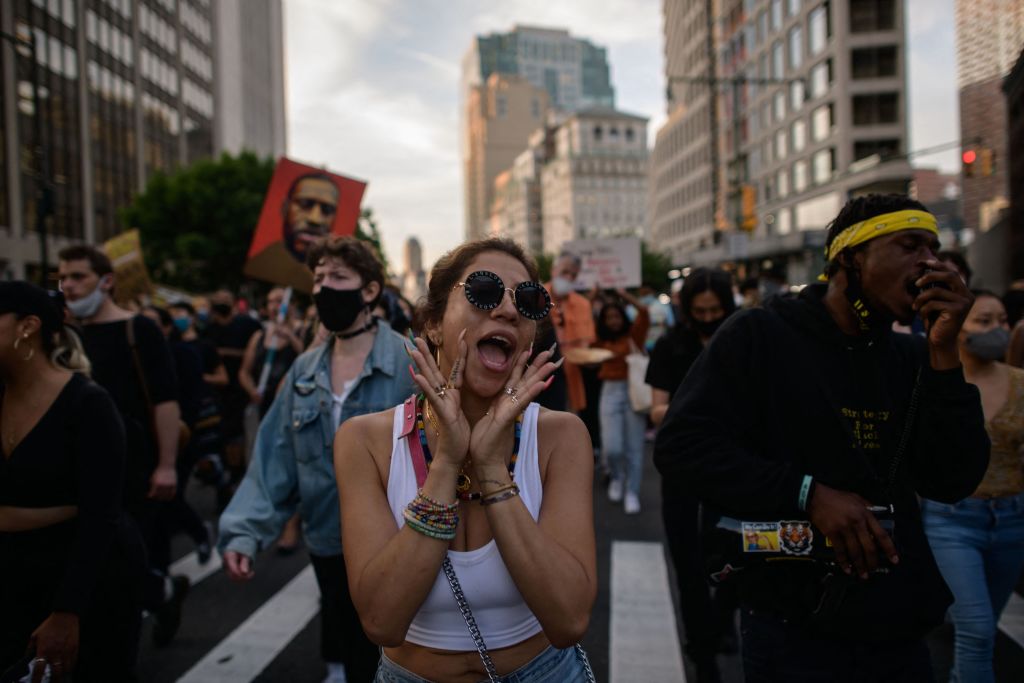Whatever one thinks of the grassroots Black Lives Matter movement, it is not the same thing as the Black Lives Matter Global Network Foundation, which was cofounded by Patrisse Cullors.
Starting BLMGNF has been very lucrative for Cullors, who has used her notoriety to land book contracts and a big juicy deal with Warner Brothers, as Variety reported in October 2020:
The co-founder of Black Lives Matter has signed her first over overall deal with Warner Bros. Television Group. Characterized as multi-year and wide-ranging, the pact will see Cullors develop and produce original programming across all platforms, including broadcast, cable and streaming.
Cullors’s agreement encompasses scripted and unscripted series, longform series, animated and kids programming, as well as digital content. Together, WBTVG and Cullors will look to amplify the work of the Black Lives Matter, which Cullors started alongside Alicia Garza and Opal Tometi back in 2013, and create more opportunities for prominent Black storytelling. Precise terms for the deal have not been disclosed.
The terms must have been good, because Cullors went on a real estate shopping spree shortly afterwards, buying four luxury homes for a total $3.2 million. That didn’t sit well with many people, and Cullors stepped down from BLMGNF in May of 2021.
The Washington Examiner reports this week that apparently no one has taken the reigns since Cullors’s resignation, and the group’s finances are a mess:
BLM co-founder Patrisse Cullors appointed two activists to serve as the group’s senior directors following her resignation in May amid scrutiny over her personal finances. But both quietly announced in September that they never took the jobs due to disagreements with BLM. They told the Washington Examiner they don’t know who now leads the nation’s most influential social justice organization… BLM previously came under fire from local black activists after the New York Post reported in April that Cullors, then its executive director, had spent $3.2 million on real estate across the United States. The reports followed BLM’s disclosure in February 2021 that it closed out 2020 with $60 million in its bank accounts.
BLM denied allegations that Cullors spent BLM funds on her personal properties. However, BLM and other activist organizations under Cullors’s control offered contracts to an art company led by the father of her only child, the Daily Caller reported.
As Sean Campbell reports in the Intelligencer, Cullors or her wife are involved in several organizations that have received money from BLMGNF, but people who have been suffering financially because of involvement in protests have received little or no help:
Some local activists contend that little of the money raised at the national level makes its way to their organizations or to the families of Black people killed by police. In November 2020, ten chapters of the Black Lives Matter Global Network Foundation issued a public call for greater financial accountability. “For years there has been inquiry regarding the financial operations of BLMGNF and no acceptable process of either public or internal transparency about the unknown millions of dollars donated to BLMGNF, which has certainly increased during this time of pandemic and rebellion,” the chapters’ statement read.
The organization responded to the criticism three months later by releasing, for the first time, some detailed information about its finances. BLMGNF said it had raised more than $90 million in 2020. It incurred $8.4 million in operating expenses, distributed $21.7 million in grants to more than 30 organizations, and retained some $60 million in its coffers. But if the disclosures were intended to quiet dissent, they didn’t succeed.
Change is costly, but activism pays, I guess.
In other news
Enough politics, right? Let’s get to the news that stays news: Robert Bickers reviews a book on how globalization changed the Chinese language:
Despite its long and extensive literary heritage, and despite being the home of some of the earliest printed books, Qing-dynasty China found itself at a profound disadvantage in the new global information order that evolved in the nineteenth century as part of the intertwined processes of colonial expansion and globalization. Foreign powers subordinated China through the deployment of advanced maritime technologies and weaponry. The Qing empire found itself hampered in its efforts to respond by the nature of its written language. Knowledge is power, goes the saying, but not if knowledge cannot be organized, retrieved, transmitted and reproduced.
How did everything become existential, Peter Funt wonders?
NASA administrator Bill Nelson said the other day that “climate change is the existential threat of our time.” The New York Times editorialized that Donald Trump and his supporters pose an “existential threat” to the Republic. Scientific American declared that wildfires are putting giant sequoias at “existential risk.” A Barron’s headline read, “Bitcoin is facing an existential crisis.” Bloomberg Law wrote, “Wall Street ends crazy year with existential angst.” Axios reports there are “existential stakes” in the debate over voting rights. Then, too, Axios tells us that Covid “has presented an existential challenge to live music.”
Julia Friedman remembers the painter Wayne Thiebaud:
Thiebaud had made his public debut in the early 1960s with a series of still lifes that pictured assorted dishes and desserts of the type ubiquitous in American diners and delis, and a series depicting neat rows of department-store haberdashery lit by then-new fluorescent lighting. Those still lifes are by far his best-known paintings, but they were only the beginning of a prolific decades-long career. Thiebaud’s death was met with a barrage of heartfelt tributes in the press and on social media, proving the popularity of his work among both amateurs and connoisseurs. The simplest explanation of this phenomenon is most likely the correct one: while his paintings can be appreciated for their subject matter by just about anybody, they are also sophisticated enough to keep the attention of experts.
Joseph Bottum writes about the tractor wars and why they are important: “The widespread use of tractors on American farms came about through an odd set of trends and ideas — mostly unrelated and yet pushing in the same direction. The elective affinities that gave us the tractor may be small and unlikely, but they also form a useful figure, a synecdoche, for how the modern age happened.”
Cancel culture creates a lot of heat in America, but we don’t have it that bad. It’s a nuisance but no real threat to free speech, at least for now. Consider the case, for example, of East German Annegret Gollin:
In 1975, the unpublished poet Annegret Gollin encountered a rather different kind of culture war: she was arrested at a music festival and told that she could either spend two years in a prison cell or become an informant for the Stasi. Gollin chose to become an informant, but was a brilliantly ineffective one — she told over a hundred of her friends that she was supposed to be spying on them — and she ended up in prison seven years later. After her incarceration, her son was taken from her, and her partner died under suspicious circumstances. Welcome to the topsy-turvy world of writing in East Germany. Gollin was a rebel against the formal constraints of the GDR: she refused permanent employment, preferring the freedom of hitchhiking and music festivals. But for the Stasi who arrested her, her true crime was her writing. Gollin had written poetry since she was very young, and her notebooks were seized upon her arrest.
Bruce Whiteman reviews Carol Shields’s collected poetry:
Many critics have noted the small-scale nature of Shields’s poems and their obsession with family, daily life, memory, and domesticity. Most do not extend beyond a single page, and the language is largely kept quite simple, in line with her advice to students to avoid complicated wording or “pretty language.” There is much that is anecdotal, and rarely would one violate the normally helpful rule not to confuse the poetic voice with the poet’s actual self by assuming that Shields really did, for example, have an Aunt Alice or a Great-Grandma whose name was Catherine. Shields’s real self in all its emotional and historical dimensions is constantly the subject at hand. She speaks unselfconsciously about — and sometimes in the voice of — her children, her husband, and her extended family members. But mostly she speaks in her own unruffled and straightforward way.


















